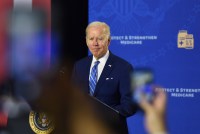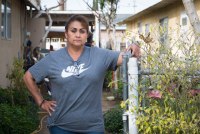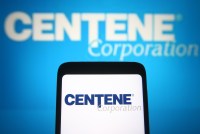Latest Morning Briefing Stories
California’s Massive Medicaid Program Works for Some, but Fails Many Others
Medi-Cal serves more than one-third of the state’s population — offering a dizzying range of care to a diverse population. In the new “Faces of Medi-Cal” series, California Healthline will assess the program’s strengths and weaknesses through the lives and experiences of its enrollees.
Idaho Dropped Thousands From Medicaid in the Pandemic’s First Years
The removals, detailed in emails between state and federal health officials, hinged on disagreements over how states could disenroll people during the public health emergency. Consumer advocates fear the alleged violation signals the mess to come on April 1, when the pandemic-era Medicaid coverage mandate ends.
Biden Promises to Fight GOP on ‘Gutting’ Medicaid. Budget Talks Seem Like Another Story.
As many lower-income Americans prepare to lose pandemic-era access to Medicaid, President Joe Biden vowed to stop Republicans from making deeper cuts to lower the national debt. Other changes may still be up for discussion.
Trabajadores comunitarios persuaden a inmigrantes mayores de tener cobertura de salud
Hasta octubre, el mes más reciente para el que hay disponibles datos, más de 300,000 adultos mayores inmigrantes que no tienen residencia legal se habían inscrito en el Medi-Cal completo, un 30% más que la proyección original del estado.
Community Workers Fan Out to Persuade Immigrant Seniors to Get Covered
California has enrolled into Medi-Cal more than 300,000 older immigrant adults lacking legal residency since May, but the state doesn’t know how many more might be eligible. Community workers are now searching for them.
California Explores Private Insurance for Immigrants Lacking Legal Status. But Is It Affordable?
Nearly half a million Californians without legal residency make too much to qualify for Medicaid yet they can’t afford to buy coverage. A state lawmaker is proposing to open up the state’s health insurance exchange as a first step to providing them affordable insurance.
California Dangles Bonuses for Nursing Homes That Add Staff
Rather than simply reward top-performing facilities, the state’s Medicaid program will hand bonuses to nursing homes — even low-rated ones — for hiring more workers and reducing staff turnover.
What the Health? From KFF Health News: Senators Have Mental Health Crises, Too
When U.S. Sen. John Fetterman of Pennsylvania checked himself into the Walter Reed National Military Medical Center for treatment of depression this month, he got an unusual reaction from his colleagues in Congress: compassion. It’s a far cry from how politicians once kept their mental health issues under wraps at all costs. Meanwhile, GOP presidential candidate Nikki Haley is stirring up controversy by proposing that all politicians over age 75 be required to pass a mental competency test to hold office. Joanne Kenen of the Johns Hopkins Bloomberg School of Public Health and Politico, Sarah Karlin-Smith of the Pink Sheet, and Rachel Roubein of The Washington Post join KHN chief Washington correspondent Julie Rovner to discuss these issues and more. Plus, for “extra credit,” the panelists suggest health policy stories they read this week that they think you should read, too.
In Tennessee, a Medicaid Mix-Up Might Land You on a ‘Most Wanted’ List
Tennessee posts the names and photos of people arrested for alleged Medicaid fraud on a government website and social media. Some people even wind up on a “most wanted” list.
Special Delivery: Heart-Heavy Health Policy Valentines
KHN shares the cream of the crop of creative valentines about health policy submitted by readers and tweeters. Our favorite is anointed with an original illustration and bragging rights as “the one.”
Se acaba la era de las vacunas y las pruebas gratuitas contra covid. ¿Quién va a pagar?
Las personas podrán obtener estas vacunas a bajo costo o sin costo mientras duren los suministros del gobierno. Luego, dependerá de su seguro de salud.
Era of ‘Free’ Covid Vaccines, Test Kits, and Treatments Is Ending. Who Will Pay the Tab Now?
Insurers, employers, and taxpayers will all be affected as drug manufacturers move these products to the commercial market.
Community Resurrects Colorado Birth Center Closed by Private Equity Firm
A private equity firm bought a birth center and then shut it down. The community brought it back as a nonprofit.
Centene Agrees to $215 Million Settlement With California for Alleged Medicaid Overbilling
The nation’s largest Medicaid insurer denies wrongdoing after the California attorney general’s office investigated it for inflating prescription drug costs.
Millones en riesgo de perder Medicaid, mientras terminan protecciones por la pandemia
Los estados se están preparando para remover a millones de personas de Medicaid, a medida que expiran las protecciones que se implementaron al comienzo de la pandemia de covid-19.
As Pandemic-Era Medicaid Provisions Lapse, Millions Approach a Coverage Cliff
States are trying to reach millions of Medicaid enrollees to make sure those still eligible remain covered and help others find new health insurance.
It’s ‘Telehealth vs. No Care’: Doctors Say Congress Risks Leaving Patients Vulnerable
Congress’ $1.7 trillion omnibus spending package included a two-year extension of pandemic-era funding that helped telehealth services grow nationwide. But that cash bridge, embraced by those delivering services to patients in rural areas, doesn’t provide much certainty for the future of remote medicine.
California’s Resolve Questioned After It Grants Medi-Cal Contract Concessions
After the Department of Health Care Services canceled Medi-Cal contract awards under pressure from major insurers, some consumer advocates question the administration’s willpower to improve care in the safety-net program.
Wave of Rural Nursing Home Closures Grows Amid Staffing Crunch
Many small-town care facilities that remain open are limiting admissions, citing a lack of staff, while a wave of others shutter. That means more patients are marooned in hospitals or placed far away from their families.
As States Seek to Limit Abortions, Montana Wants to Redefine What Is Medically Necessary
Montana officials are looking to tighten rules around medically necessary abortions for those who use Medicaid as their health insurance. Reproductive health advocates and Democratic lawmakers have said the move is part of a broader agenda to whittle away access to the procedure.























